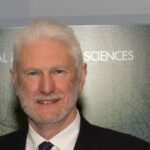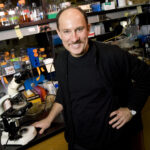GENETICS and G3: Genes | Genomes | Genetics are pleased to announce four new editors: Leah Cowen, Michael Goddard, Joseph Heitman, and Hongyu Zhao.
GENETICS
Leah Cowen

Leah Cowen is Vice President of Research at the University of Toronto (UofT), Professor in the Department of Molecular Genetics, co-Director of the CIFAR Fungal Kingdom: Threats & Opportunities program, and co-Founder of Bright Angel Therapeutics—a company that leverages state-of-the-art technologies for development of novel antifungal therapeutics. She received her undergraduate degree from the University of British Columbia, a PhD from UofT, and pursued postdoctoral studies at the Whitehead Institute. She has an outstanding track record of excellence in research, scholarship, and education. She has published over 110 high impact research articles and been recognized with many awards including a Burroughs Wellcome Fund Career Award, Grand Challenges Canada Star in Global Health Award, Merck Irving S. Sigal Memorial Award, E.W.R. Steacie Award, and Canada Research Chair in Microbial Genomics & Infectious Disease. She has been elected as Fellow of the American Academy of Microbiology and American Association for the Advancement of Science.
Michael Goddard

Michael Goddard works on the genetics of quantitative or complex traits in livestock and in humans. He was a co-author on Meuwissen, Hayes, and Goddard (2001), which first presented genomic prediction or genomic selection. This methodology uses genotypes at markers such as SNPs to predict the genetic value or phenotype of individuals.
Hongyu Zhao

Dr. Hongyu Zhao is the Ira V. Hiscock Professor of Biostatistics, Genetics, and Statistics and Data Science at Yale University. He received his BS in Probability and Statistics from Peking University and PhD in Statistics from UC Berkeley. His research interests are the developments and applications of statistical methods in molecular biology, genetics, drug developments, and precision medicine. His current projects include the analysis of biobank samples with genomics, imaging, and wearable device data, cancer multi-omics data, brain multi-omics data, and single cell data.
G3: Genes | Genomes | Genetics
Joseph Heitman

Joseph Heitman, MD, PhD is James B. Duke Professor and Chair, Department of Molecular Genetics and Microbiology, Duke University. His research studies model and pathogenic fungi addressing fundamental questions of scientific and medical importance. Pioneering studies with Baker’s yeast revealed how immunosuppressive natural products interdict signaling cascades via FKBP12-drug complexes, and discovered TOR as a globally conserved nutrient sensor targeted by the immunosuppressive, antiproliferative drug rapamycin. His research discovered unisexual reproduction of pathogenic microbes, with implications for pathogen emergence, how sex generates diversity, and how sex evolved. Dr. Heitman’s lab has developed genetic and genomic approaches elucidating molecular principles of fungal virulence, identifying therapeutic targets, and illustrating convergent evolution of fungal mating-type loci with mammalian, insect, and plant sex chromosomes, defined the calcium-activated protein phosphatase calcineurin as a conserved fungal virulence factor, and elucidated functions of RNAi in microbial pathogen genome integrity, hypervirulent outbreak lineages, and drug resistance via epimutation.













